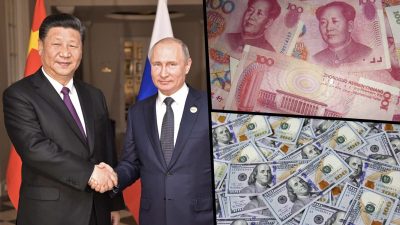Washington Sanctioning Russia and China – Enhanced Monetary Independence?

On 6 September 2024, Russia Today (RT) published a report on how the US was sanctioning Chinese banks for receiving Yuan payments from Russia. The editor of this RT article, apparently an expert in matters of finance, must have missed something, or slipped into a western propaganda trap.
The article intimidated already in its title that the US “Finally succeeded in choking off Russia’s biggest trade lifeline”, meaning China.
See this for full RT article.
.
Screenshot from RT
.
Those who know some basics about Russia – China relations, understand US sanctions are not doing anything to Russia anymore – as Russia is fully dedollarized by now.
As to punishing Chinese banks for receiving payment from Russia in Yuan – that will not work either. Chinese banks are largely immune against US attempted “sanctions”, simply because the US needs them for trading with China.
If anybody knows about America’s hysteric consumerism, they know what we are talking about.
American average consumers would take to the streets, if Chinese goods, like iPhones, other electronic equipment and consumer goods would suddenly “dry up”.
Besides there are other means for transferring funds between the two countries. Russian and Chinese Central Banks have since many years SWAP Agreements. They are operated and may be expanded between the two partners without any outside interference. The Chinese banks have accounts with their central bank.
A western mind would maybe quickly respond, why does China not “sanction” back? Of course, that would be an option. China has many more leverage points to “sanction” the US than vice versa.
Chinese ethics are way above applying illegal retaliations, such as sanctioning. Sanctioning is interfering with other countries’ economic and political sovereignty – it is economic warfare. Not allowed by any measure of international law.
China’s ethics and long-term thinking are linked to an over 5000-years-old Tao principle. See this philosophical concept – “Tao 68”, called “Unite with Heaven”:
A good General doesn’t like aggression
A good warrior doesn’t know hate
If you want to conquer your enemy, don’t confront him.
Put yourself below him
This is called the power of not-fighting
This is using the ability of mankind
This is called since ancient times, to be in harmony with heaven
And it is the greatest power there is.
The West could take a lesson or two, or three – from this philosophy – and the world would be a better place, a more harmonious place, a place where Peace Talks should be possible to resolve conflicts and wars; a place where, instead of dividing to conquer, togetherness with individual sovereignty could prosper – leading to a world of common benefits for all.
China has multiple times offered her good diplomatic offices to mediate Peace Talks between Russia and Ukraine. The West has rejected such offers. The West has rejected an almost signed Peace Agreement sponsored by Turkey in 2022. The West does not want Peace.
War is the economic survival of most of the West, especially the United States and soon all NATO countries. Economics based on killing must and is going to fail. A western collapse is imminent.
RT may want to take note of these details.
*
Click the share button below to email/forward this article to your friends and colleagues. Follow us on Instagram and Twitter and subscribe to our Telegram Channel. Feel free to repost and share widely Global Research articles.
Get Your Free Copy of “Towards a World War III Scenario: The Dangers of Nuclear War”!
Peter Koenig is a geopolitical analyst and a former Senior Economist at the World Bank and the World Health Organization (WHO), where he worked for over 30 years around the world. He is the author of Implosion – An Economic Thriller about War, Environmental Destruction and Corporate Greed; and co-author of Cynthia McKinney’s book “When China Sneezes: From the Coronavirus Lockdown to the Global Politico-Economic Crisis” (Clarity Press – November 1, 2020).
Peter is a Research Associate of the Centre for Research on Globalization (CRG). He is also a non-resident Senior Fellow of the Chongyang Institute of Renmin University, Beijing.
Featured image source


